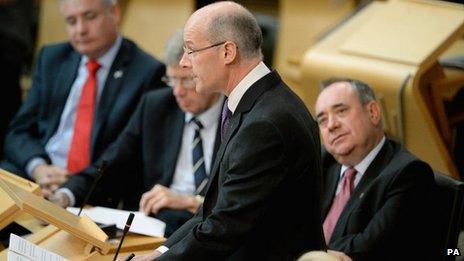Annual battle of the Scottish budget
- Published

John Swinney pointed to alack of powers offered by the devolution settlement to address a reserved issue like welfare
Customarily, the annual battle over the Scottish government budget centres upon issues which are the direct responsibility of Holyrood ministers.
In the past, there have been substantial and substantive arguments over such varied issues as college courses, protecting the NHS, the council tax, apprentices, transport and environmental support.
And this year? The big controversy has been over a topic which is reserved and which, by definition, has no budget line of its own in the Holyrood programme.
I refer, of course, to the impact of UK welfare spending constraint and in particular to the withdrawal of the spare room subsidy, also known by its cognomen of the bedroom tax.
At one level, this represents a political challenge to the Finance Secretary, John Swinney. He has been under pressure from Labour - he remains under pressure - to find funds to mitigate the impact of the changes in Scotland.
John Swinney has duly responded - providing an extra £20m this year which will go to enhance discretionary housing payments controlled by councils to help those most in need. (They already have this power under a UK government scheme.)
That cash level matches the demand advanced by housing charity Shelter. But it is less than half the sum which Labour says is necessary - and it is for this year only.
Cue Labour objections.
Mr Swinney's response?
There is a very strict limit to the amount which he can, legally, divert from devolved budgets to an area where, again legally, he has no direct responsibility: that of the welfare system.
And why not next year or the year after? Mr Swinney said he hoped that, by then, UK ministers would have changed tack and dropped the policy altogether.
Standard political charge and counter-charge. However, there is a further element.
Sensitive topic
At another level, the controversy over welfare offers a political opportunity for John Swinney and the SNP.
It allows the finance secretary to point to the lack of powers offered by the devolution settlement to address a reserved issue like welfare.
However, given the sensitive nature of this topic, given that it is about struggling families, it would not do to be too explicit, too blunt about that point.
Hence Mr Swinney's diplomatic dexterity on the topic.
In a single section of his statement, for example, he both points out that he lacks the "legal or financial powers" to tackle welfare - but also stresses that he will not "walk by on the other side".

The SNP has been under Labour pressure to mitigate the impact of welfare changes in Scotland
There is a further element to this controversy whereby the SNP argue that the best way to redress perceived grievances on welfare is for Scotland to attain the powers to affect such matters.
Independence, in short.
That returns a challenge to Labour which regards the "bedroom tax" as iniquitous and would welcome its withdrawal - but which notes that its own precise policy will have to await the party manifesto for the next UK General Election.
A position which is consistent with customary electioneering practice - but which perhaps provides an extra difficulty in Scotland where Labour's principal opponents are the SNP, not the Tories.
However, Labour has a further rebuttal ready which is to argue that welfare redistribution is best done across the wider polity and tax base of the UK.
Against which, the SNP argue that the best policy-makers in Scotland are those who directly reflect the views of the Scottish people.
Against which . . . you get the concept by now.